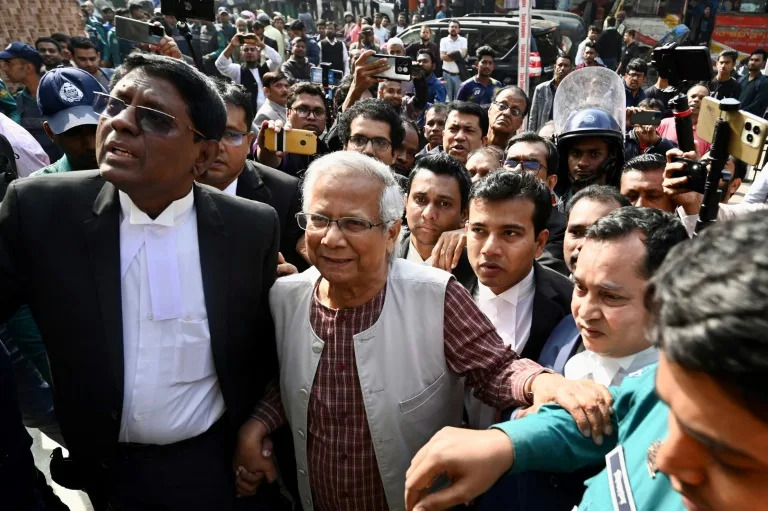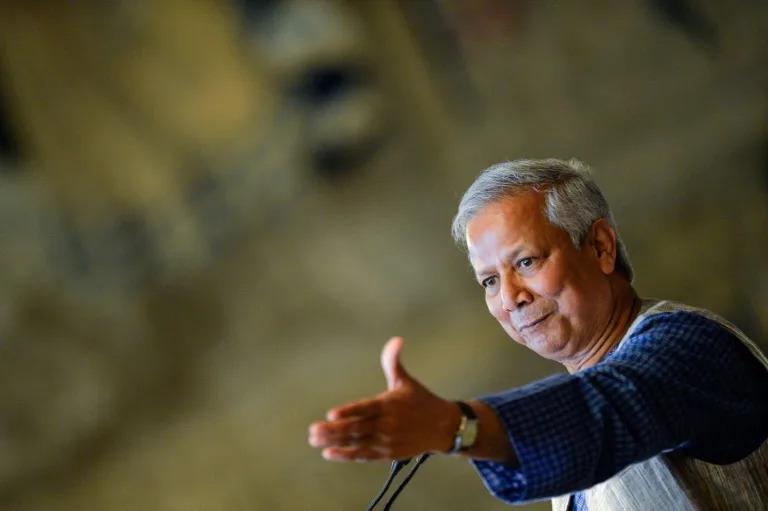Nobel winner Yunus convicted in Bangladesh labour law case
Shafiqul Alam
Mon, 1 January 2024

Bangladeshi Nobel peace laureate Muhammad Yunus (C) appears in a court in Dhaka on January 1, 2024. Yunus was facing six months in jail with a court set to rule on January 1 on a labour law case decried by his supporters as politically motivated. (Munir uz zaman)
Nobel peace laureate Muhammad Yunus was convicted on Monday of violating Bangladesh's labour laws in a case decried by his supporters as politically motivated.
Yunus, 83, is credited with lifting millions out of poverty with his pioneering microfinance bank but has earned the enmity of longtime Prime Minister Sheikh Hasina, who has accused him of "sucking blood" from the poor.
Hasina has made several scathing verbal attacks against the internationally respected 2006 Nobel Peace Prize winner, who was once seen as a political rival.
Yunus and three colleagues from Grameen Telecom, one of the firms he founded, were accused of violating labour laws when they failed to create a workers' welfare fund in the company.
A labour court in the capital Dhaka convicted and sentenced them to "six months' simple imprisonment", lead prosecutor Khurshid Alam Khan told AFP, adding that all four were immediately granted bail pending appeals.
All four deny the charges. Dozens of people staged a small rally in support of Yunus outside the court.
"I have been punished for a crime that I haven't committed," Yunus told reporters after the hearing.
"If you want to call it justice, you can."
Yunus is facing more than 100 other charges over labour law violations and alleged graft.
He told reporters after one of the hearings last month that he had not profited from any of the more than 50 social business firms he had set up in Bangladesh.
"They were not for my personal benefit," Yunus said at the time.
Another of his lawyers, Khaja Tanvir, told AFP that the case was "meritless, false and ill-motivated".
"The sole aim of the case is to harass and humiliate him in front of the world," Tanvir said.
- 'Travesty of justice' -
Irene Khan, a former Amnesty chief now working as a UN special rapporteur who was present at Monday's verdict, told AFP the conviction was "a travesty of justice".
"A social activist and Nobel laureate who brought honour and pride to the country is being persecuted on frivolous grounds," she said.
In August, 160 global figures, including former US president Barack Obama and ex-UN secretary-general Ban Ki-moon, published a joint letter denouncing "continuous judicial harassment" of Yunus.
The signatories, including more than 100 of his fellow Nobel laureates, said they feared for "his safety and freedom".
Critics accuse Bangladeshi courts of rubber-stamping decisions made by Hasina's government, which is all but certain to win another term in power next week at elections boycotted by the opposition.
Her administration has been increasingly firm in its crackdown on political dissent, and Yunus's popularity among the Bangladeshi public has for years earmarked him as a potential rival.
Amnesty International accused the government of "weaponizing labour laws" when Yunus went to trial in September and called for an immediate end to his "harassment".
Criminal proceedings against Yunus were "a form of political retaliation for his work and dissent", it said.
sa/gle/dhw
Muhammad Yunus: Bangladesh's 'banker to the poo
Shafiqul ALAM
Mon, 1 January 2024

Bangladeshi microfinance pioneer Muhammad Yunus was awarded the Nobel Peace Prize in 2006 (ANDREAS SOLARO)
Jailed Nobel-winning microfinance pioneer Muhammad Yunus is celebrated around the world for helping millions of people out of poverty, but at home in Bangladesh he has a powerful enemy.
The 83-year-old, known as the "banker to the poorest of the poor", was awarded the Peace Prize in 2006 for his work loaning small cash sums to rural women, allowing them to invest in farm tools or business equipment and boost their earnings.
Grameen Bank, the microfinance lender he founded, was lauded for helping unleash breakneck economic growth in Bangladesh, and its work has since been copied by scores of developing countries.
"Human beings are not born to suffer the misery of hunger and poverty," Yunus said during his Nobel lecture, daring his audience to imagine a world where deprivation was confined to history museums.
But his public profile in Bangladesh has earned him the hostility of Prime Minister Sheikh Hasina, who once accused him of "sucking blood" from the poor.
On Monday he and three colleagues from one of the companies he founded were sentenced to jail terms of six months -- but immediately bailed pending appeal -- by a Dhaka labour court which found they had illegally failed to create a workers' welfare fund.
All four had denied the charges and the case has been criticised as politically moviated by watchdogs including Amnesty International.
Yunus still faces more than 100 other charges on alleged graft and labour law violations.
Hasina's administration has been increasingly cracked down on political dissent, and Yunus's popularity has for years earmarked him as a potential rival.
The year after winning the Nobel Prize, Yunus announced plans to set up his own "Citizen Power" party to end Bangladesh's confrontational political culture, which has been punctuated by instability and periods of military rule.
He abandoned those ambitions within months, but the enmity aroused by his challenge to the ruling elite has persisted.
Since Hasina returned to power in 2008, Yunus has been hit with a series of criminal cases and a smear campaign by a state-led Islamic agency that accuses him of promoting homosexuality.
The government unceremoniously forced him out of Grameen Bank in 2011 -- a decision fought by Yunus but upheld by Bangladesh's top court.
A telecom firm he chairs was hit with a graft probe in 2022 over accusations it had embezzled employee funds -- claims that critics say are politically motivated.
Hasina also blamed Yunus for the World Bank's decision to cancel funding for a bridge near the capital Dhaka after the project was embroiled in a bribery scandal.
The bridge finally opened in 2022 after years of construction delays, and at its opening ceremony, Hasina said Yunus should be "dipped in the river" for jeopardising its completion.
Yunus has adamantly denied influencing the World Bank's decision and his office has described the claims as "purely imaginary".
- 'Poverty was all around me' -
Yunus was born into a well-to-do family -- his father was a successful goldsmith -- in the coastal city of Chittagong in 1940.
He credits his mother, who offered help to anyone in need who knocked on their door, as his biggest influence.
Yunus won a Fulbright scholarship to study in the United States and returned soon after Bangladesh won its independence from Pakistan in a brutal 1971 war.
When he returned, he was chosen to head Chittagong University's economics department, but the young country was struggling through a severe famine and he felt compelled to take practical action.
"Poverty was all around me, and I could not turn away from it," he said in 2006.
"I found it difficult to teach elegant theories of economics in the university classroom... I wanted to do something immediate to help people around me."
After years of experimenting with ways to provide credit for people too poor to qualify for traditional bank loans, he founded Grameen Bank in 1983.
The institution now has more than nine million clients on its books, according to its most recent annual report (2020), and over 97 percent of its borrowers are women.
Yunus has won numerous high honours for his life's work, including a US Presidential Medal of Freedom awarded by Barack Obama.
sa/gle/qan/dhw
No comments:
Post a Comment